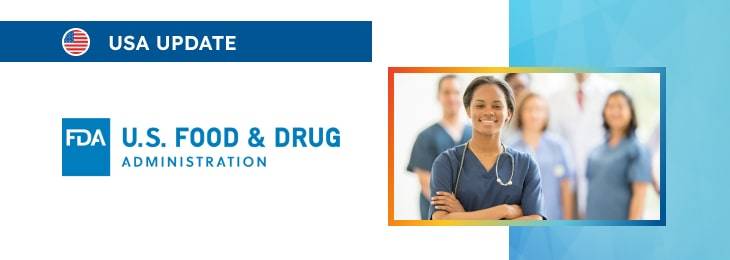The article addresses the aspects related to the authority’s expectations associated with the respective program.

Table of content
The Food and Drug Administration (FDA or the Agency), the US regulating authority in the sphere of healthcare products, has published a draft guidance document dedicated to 510(k) Third Party Review Program and Third Party Emergency Use Authorization (EUA) Review.
Once finalised, the document will provide an overview of the applicable regulatory requirements, as well as additional clarifications and recommendations to be taken into consideration by medical device manufacturers and other parties involved to ensure compliance thereto.
At the same time, provisions of the guidance are non-binding in their legal nature, nor are they intended to introduce new rules or impose new obligations.
Moreover, the authority explicitly states that an alternative approach could be applied, provided such an approach is in line with the relevant legislation and has been agreed with the authority in advance.
The scope of the guidance covers, inter alia, the authority’s expectations of Third Party Review Organisations, as well as their recognition and re-recognition.
According to the guidance, the FDA sets forth specific expectations for Third Party 510(k) Review Organizations (3P510k ROs) involved in the premarket review of eligible 510(k) submissions.
These expectations are guided by the FD&C Act and aim to ensure that the review process is conducted with integrity, impartiality, and technical competence.
Core Qualifications for 3P510k ROs
As explained by the document, the FDA mandates that 3P510k ROs adhere to several key qualifications:
- Government Employment Restriction: Individuals employed by 3P510k ROs should not hold positions within the Federal Government, ensuring an essential separation between the regulator and the entity being regulated.
- Organizational Independence: The organizations must maintain their independence, devoid of ownership or control by device manufacturers, suppliers, or vendors. This independence is critical to prevent any potential bias in the review process.
- Legal Status and Ethical Practices: 3P510k ROs should be legally recognized entities capable of conducting their proposed activities. They are expected to operate under generally accepted professional and ethical business practices.
- Non-involvement in the Device Industry: These organizations should not engage in designing, manufacturing, promoting, or selling devices to prevent conflicts of interest.
- Commitment to Accuracy and Confidentiality: 3P510k ROs are required to certify the accuracy of reported information, manage their workload within their capacity, treat sensitive information as proprietary, promptly address complaints, and protect against financial conflicts of interest.

Additional Criteria and Operational Expectations
The document further outlines additional criteria to be taken into consideration, namely:
- The FDA emphasizes the avoidance of financial conflicts of interest and expects 3P510k ROs to establish robust policies to identify and manage any potential conflicts.
- Additional qualifications specific to the type of review are published in the Federal Register, which 3P510k ROs should consider.
- 3P510k ROs are advised against the practice of “forum shopping” by 510(k) submitters, where multiple submissions are made to find a favourable review.
- All submissions and communications with the FDA should be conducted in English for clarity and consistency.
Management of Impartiality and Personnel Requirements
According to the guidance, impartiality is crucial for 3P510k ROs, necessitating established policies and procedures to mitigate any conflicts of interest.
These should align with IMDRF guidelines.
Personnel involved in the review process must have comprehensive knowledge of relevant laws and regulations and be trained adequately in the specific requirements of medical device reviews.
The FDA recommends that 3P510k ROs refrain from assisting in the preparation of submissions and ensure their personnel do not review submissions with which they have prior affiliations.
Training and Competence
The document further elaborates that designated personnel in 3P510k ROs are required to undergo FDA training for recognition and re-recognition.
This training is essential for ensuring that reviewers are up-to-date with the latest regulatory requirements and standards. Personnel reviewing EUA requests, particularly for in vitro diagnostic products, need to complete specialized training provided by the FDA.
Usage of External Technical Experts, Confidentiality and Recordkeeping
According to the applicable regulations, 3P510k ROs employing external Technical Experts must ensure these experts adhere to the same standards of conflict of interest and competence as their internal staff.
Records of their qualifications and performance evaluations should be maintained diligently. P510k ROs are also obliged to maintain the confidentiality of information received in submissions.
The FDA outlines specific conditions under which this information can be released. These organizations must keep comprehensive records of their operations, including personnel training, handling of confidential information, and conflict of interest policies.
Conclusion
In summary, the FDA sets stringent requirements for 3P510k ROs to ensure the integrity and effectiveness of the medical device review process. As set forth under the applicable legislation, 3P510k ROs play a vitally important role in ensuring the safety and efficacy of medical devices, ultimately protecting public health, so achieving and maintaining compliance with the requirements outlined in the present guidance is crucial for the entire framework to meet its goals.
How Can RegDesk Help?
RegDesk is a holistic Regulatory Information Management System that provides medical device and pharma companies with regulatory intelligence for over 120 markets worldwide. It can help you prepare and publish global applications, manage standards, run change assessments, and obtain real-time alerts on regulatory changes through a centralized platform. Our clients also have access to our network of over 4000 compliance experts worldwide to obtain verification on critical questions. Global expansion has never been this simple.

